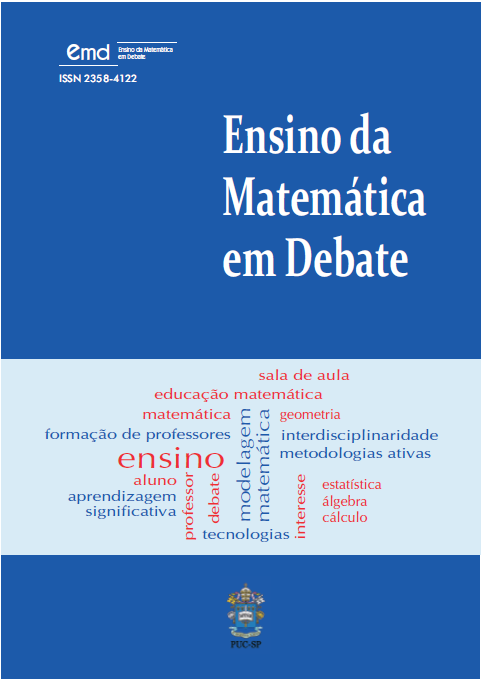Contributions of the disciplines of the Mathematics Licentiate Degree Course to the Professional Development of Basic Education Teachers
Keywords:
Formation of teachers, Math, Curricular Components, Basic EducationAbstract
The article aims to analyze the curricular components of the Mathematics Licentiate Degree Course of the Federal University of Pará (UFPA) with a view to promote a reflection about the contribution of the disciplines proposed in the course to formation of the teacher who will act in the Basic Education. The research adopts the qualitative perspective and the informations are elapsed to the from the documental research Pedagogic Project of the Course (PPC) and the interviews realized with 13 (thirteen) students, in order to investigate their perspective about the disciplines that contribute na the ones the leave possible gaps to the professional development of the future teacher. The theoretical foundation was based on: Gonçalves (2000) and Fiorentini (2005) who do significant studies about professional development and the interactions between theoretical and didactic-pedagogical disciplines in math courses. The study brougth as results that the Mathematics Licentiate Degree Course presents certain gaps regarding the distribuition of workload between teoretical disciplines(math specific and pedagogical disciplines) and practical disciplinies shuch as internships and laboratories, beyond the teachers of the course don’t promote reflections and relationships between the disciplines seen in graduation and basic education. In this sense, after the 4 (for) Years in the gym when the future teacher act in the teaching of mathematics in basic education find gaps left by formation, failing to perform reflections about teaching and develop different methodologies during his teaching practice, which should be taught and promoted along the initial formation in the licentiate degree in mathematics.
References
ALVES, N. (Org.). Formação de professores: pensar e fazer. São Paulo: Cortez, 1992.
BATISTA, I. A.; MEDRADO, M. M. M.; COSTA, R. de J. A importância das disciplinas pedagógicas na formação dos licenciandos de ciências biológicas do IFTO - campus Araguatins. 9ª Jornada de Iniciação Científica e Extensão. Disponível em: https://propi.ifto.edu.br/index.php/jice/9jice/paper/viewFile/9265/4222. Acesso em: 19/03/2021.
BAZZO, V. Constituição da profissionalidade docente na educação superior: desafios e possibilidades. 2007. 269f. Tese (Doutorado em Educação) Faculdade de Educação da Universidade Federal do Rio Grande do Sul, Porto Alegre, 2007.
BRASIL. Parecer CNE/CP nº 9, de 8 de maio de 2001 - Diretrizes Curriculares Nacionais para a Formação de Professores da Educação Básica, em nível superior, curso de licenciatura, de graduação plena, 2001. Disponível em: http://portal.mec.gov.br/cne/arquivos/pdf/009.pdf. Acesso em: 19/03/2021.
BRASIL. Resolução CNE/CP nº 1, de 18 de fevereiro de 2002 - Institui Diretrizes Curriculares Nacionais para a Formação de Professores da Educação Básica, em nível superior, curso de licenciatura, de graduação plena. Disponível em: http://portal.mec.gov.br/escola-de-gestores-da- educacao-basica/323-secretarias-112877938/orgaos-vinculados-82187207/13207-resolucao-cp- 2002. Acesso em: 20/03/2021.
BRASIL. Resolução CNE/CP nº 2, de 19 de fevereiro de 2002 - Institui a duração e a carga horária dos cursos de licenciatura, de graduação plena, de formação de professores da Educação Básica em nível superior. Disponível em: http://portal.mec.gov.br/escola-de-gestores- da-educacao-basica/323-secretarias-112877938/orgaos-vinculados-82187207/13207-resolucao-cp- 2002. Acesso em: 20/03/2021.
CANDAU, V. M. F. (Org.). Novos rumos da licenciatura. Brasília, DF: INEP/PUC-RJ, 1987.
DALBERIO, O.; BERTOLDI, P. O Desafio da Formação e da Atuação do Professor. Ensino em
Re-Vista, v. 19, n.1, jan./jun , 2012.
D’AMBROSIO, Ubiratan. Educação Matemática: da teoria à prática. 4 ed. Campinas, SP: Papirus, 1996.
DE SOUSA, C. P. Desafios da formação de professores. Rev. Diálogo Educ., Curitiba, v. 17, n. 53, p. 739- 756, 2017.
FIORENTINI, Dario. A formação matemática e didático-pedagógica nas disciplinas da licenciatura em matemática. Revista de Educação PUC-Campinas, [S.l.], n. 18, jul. 2005. ISSN 2318-0870. Disponível em: <http://periodicos.puc-campinas.edu.br/seer/index.php/reveducacao/article/view/266>. Acesso em: 04 jun. 2021.
Downloads
Published
How to Cite
Issue
Section
License
Copyright (c) 2024 Ensino da Matemática em Debate

This work is licensed under a Creative Commons Attribution-NonCommercial 4.0 International License.

Este obra está licenciado com uma Licença Creative Commons Atribuição 4.0 Internacional.






